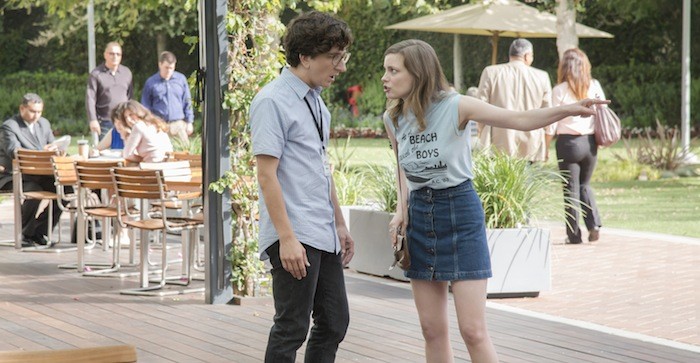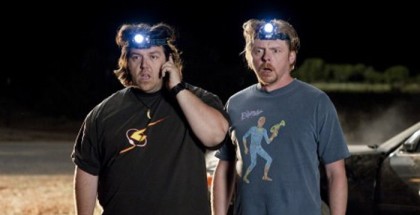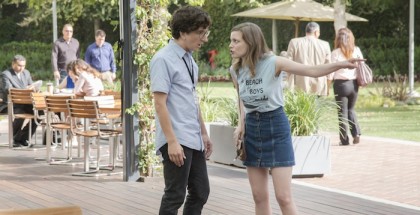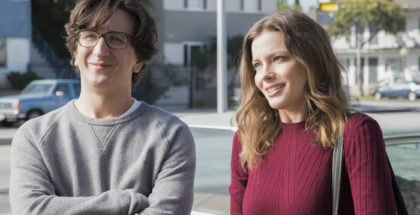Netflix UK TV review: Love (Season 1)
Review Overview
Cast
8Characters
7Commitment
6David Farnor | On 19, Feb 2016
“Did he ask you out?” “No, it’s worse. He likes me.”
You might wonder why Love, Netflix’s new romantic comedy, is released on the streaming site five days after Valentine’s Day. The truth is simple: it’s not exactly romantic. Chronicling the pangs and passions of two 30-somethings stumbling into a relationship, our main couple live in a commitment-phobic world where love is something to be feared and there’s nothing worse than someone having feelings for you.
That weirdly anti-romantic approach becomes painfully clear in the opening episode – with an emphasis on the word “painfully”. Rather than begin with a meet-cute or charming first date, we find our leads in the middle of failed relationships, dealing with the awkwardness of romance gone wrong. Mickey (Gillian Jacobs) escapes from the clasps of a drunken partnership, while Gus (Paul Rust) is ditched, if anything, for being too loving. No wonder they – and the show – are so reluctant for them to get together.
That means you’ll have to wait a whole episode for Mickey and Gus to even end up on each other’s radars, let alone start swapping messages, the kind of pacing that could well surprise, or even deter, viewers. But it’s also the kind of pacing that Netflix has become synonymous with, as its hands-off attitude towards creative talent means that writers and directors have the freedom to roam through narratives at their own speed. The result is something that does what some of the best romantic comedies do: embrace the flaws of its characters. By starting off at the break-up end of the L word, the show brings to mind the recent film Enough Said, which allowed any eventual affection to blossom through the filter of each character’s problems: unlike the thrill of a new tryst, where you uncover new facts about your other half every step of the way, we go into Love aware of the obstacles in cupid’s way. Horribly, horribly aware.
A lot of that comes from the central performers, who embrace their mucked-up lives with a down-to-earth believability. Paul Rust is suffocatingly nice as Gus. He flaps his hands about and shrugs like a Woody Allen in waiting, uneasy when breaking the rules but uncomfortable when following them too. Gillian Jacobs is disturbingly excellent as Mickey, a substance-hoovering, abrasive woman with a cruel edge to match her sharp tongue. We see them both be appalling people in all walks of their lives. A detour at Jacobs’ workplace (a radio station) with a boss (a scene-stealing Brett Gelman) who may or may not be hitting on her climaxes in a darkly comic, yet tragic exchange. Rust’s occupation as an on-set tutor for a fictional TV series (“Wichita”, mocking the current run of young adult TV shows) is just as awkward, as he balances both trying to be strict and trying to be nice to its under-pressure child star (a fantastically obnoxious Iris Apatow), all the while sickeningly hoping that he will somehow get his script for the show read.
There are cliches present in both the characters, as one loudly disrupts a party and the other throws his Blu-rays away as an act of rebellion, but Judd Apatow’s strength has always been in creating real people from such stereotypes, regardless of gender. In no time at all, Gus is dubiously being offered a threesome out of nowhere, while he is part of a group of friends whose hobby is inventing songs for movies with no theme tunes – something that nobody does in real life, but that you’ll immediately want to do yourself after watching. The script eventually manages to escape such nerdy wish fulfilment, though, for something more substantial than the usual affair you find in male-penned movies. In fact, Rust’s long-nosed, bespectacled nerd becomes genuinely sympathetic as the episodes go on. Co-creator Lesley Arfin (Rust is also credited) helps to bring out Mickey’s darker side too, moving her away from a shallow, tormented figure to someone with genuine problems, which the show shows no sign of skirting around. Care and consideration is taken with both the casting and the writing – Mickey’s sombre streak is deftly balanced out by Australian comedian Claudia O’Doherty as her hilarious roommate, Bertie. “We could do it together!” she cries with irrepressible enthusiasm, after seeing a workout session on TV. “Mmmmmmm… no,” comes Mickey’s blunt reply.
Make no mistake, though: there are more gasps of agony than sighs of delight, or even laughs, in the programme’s first four episodes. This is an unflinching take on love that has a spiky honesty – it’s less a will-they-won’t-they and more a why-on-earth-would-they. The result is a perfect match for Apatow, whose wayward pacing has always been a problem on the big-screen. Given more of a leash to explore his characters’ emotions, he, Arfin and Rust produce something that is deceptively engaging and nuanced, presuming, of course, you can overcome the initial obstacles – this is, rather aptly, a series that requires commitment to get the most out of it. It may not be an instant classic (HBO’s Togetherness manages to juggle the same, low-key sincerity with an immediate emotional engagement), but Gus and Mickey’s relationship is worth seeing out. The more time you spend with Love, the more you like it.
All episodes of Love: Season 1 are available on Netflix UK, as part of an £9.99 monthly subscription.





















